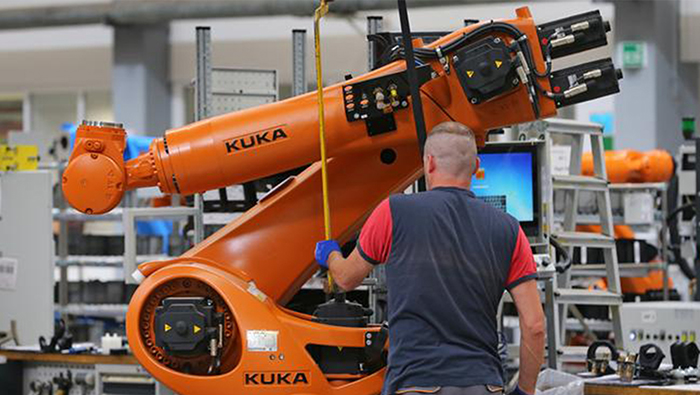
The massive public health crisis unleashed by the novel coronavirus worldwide has sent markets across the world spiralling. While the market meltdown is bad news for shareholders, it presents a chance for opportunistic investors and corporate raiders to buy stocks at attractive prices.
Authorities in Europe are becoming increasingly worried about foreign investors launching hostile takeover bids to acquire companies in strategic sectors. "Low stock prices represent an opportunity for corporate mergers and restructuring," Guntram Wolff, director of the Brussels-based economic think tank Bruegel, told DW.
"Such restructuring can be welcome if it helps the system to cope with the shock. At the same time, the European Commission and EU member states are aware that in such a situation, strategic assets need to be protected," he added.
The COVID-19 crisis is expected to have a very large negative economic impact on the EU and the euro area. In Germany alone, the ifo economic institute estimates that it could cost the economy over half a trillion euros and more than a million jobs.
Vulnerable times
"The corona crisis looks set to amplify state-owned economic actors' penchant for strategically investing in critical and future sectors of European economies," Jonathan Hackenbroich, a policy fellow for economic statecraft at the European Council on Foreign Relations (ECFR), told DW.
"Now that everyone is vying for outside money, companies could get bought up and know-how and capacity in critical future sectors transferred out of Europe, to China or the US or other countries," he said.
The expert pointed to recent reports suggesting a US bid to acquire German-based company CureVac, which is working on a vaccine for the novel coronavirus. Although the company later denied that a formal offer was made, Hackenbroich said the episode shows the need for Europeans to put in place effective arrangements to thwart such foreign attempts to take over strategic sectors of the European economy.
The European Commission, the EU's executive arm, recently issued guidelines to protect firms against takeovers. "As in any crisis, when our industrial and corporate assets can be under stress, we need to protect our security and economic sovereignty," Commission head Ursula von der Leyen said.
Severe economic impact
In 2016, when the Chinese home appliance maker Midea took over a cutting-edge German robotics firm, Kuka, many in Europe's economic powerhouse were alarmed. The takeover stoked concerns in Germany over losing key high-tech know-how to China.
The German government has since been wary of Chinese and US investors moving to take over key tech firms.
The massive public health crisis unleashed by the novel coronavirus worldwide has sent markets across the world spiraling. While the market meltdown is bad news for shareholders, it presents a chance for opportunistic investors and corporate raiders to buy stocks at attractive prices.
Authorities in Europe are becoming increasingly worried about foreign investors launching hostile takeover bids to acquire companies in strategic sectors. "Low stock prices represent an opportunity for corporate mergers and restructuring," Guntram Wolff, director of the Brussels-based economic think tank Bruegel, told DW.
"Such restructuring can be welcome if it helps the system to cope with the shock. At the same time, the European Commission and EU member states are aware that in such a situation, strategic assets need to be protected," he added.
The COVID-19 crisis is expected to have a very large negative economic impact on the EU and the euro area. In Germany alone, the ifo economic institute estimates that it could cost the economy over half a trillion euros and more than a million jobs.
Vulnerable times
"The corona crisis looks set to amplify state-owned economic actors' penchant for strategically investing in critical and future sectors of European economies," Jonathan Hackenbroich, a policy fellow for economic statecraft at the European Council on Foreign Relations (ECFR), told DW.
"Now that everyone is vying for outside money, companies could get bought up and know-how and capacity in critical future sectors transferred out of Europe, to China or the US or other countries," he said.
The expert pointed to recent reports suggesting a US bid to acquire German-based company CureVac, which is working on a vaccine for the novel coronavirus. Although the company later denied that a formal offer was made, Hackenbroich said the episode shows the need for Europeans to put in place effective arrangements to thwart such foreign attempts to take over strategic sectors of the European economy.
The European Commission, the EU's executive arm, recently issued guidelines to protect firms against takeovers. "As in any crisis, when our industrial and corporate assets can be under stress, we need to protect our security and economic sovereignty," Commission head Ursula von der Leyen said.
Severe economic impact
In 2016, when the Chinese home appliance maker Midea took over a cutting-edge German robotics firm, Kuka, many in Europe's economic powerhouse were alarmed. The takeover stoked concerns in Germany over losing key hi-tech know-how to China.
The German government has since been wary of Chinese and US investors moving to take over key tech firms.
To forestall such acquisitions, Berlin last year proposed a new industrial strategy that increases the government's powers to scrutinize and potentially block takeover bids in strategic sectors of the economy.
It would also allow government ministers to intervene and block whenever a non-EU entity tried to buy a stake of 10% or more in any German firm that's active in key areas such as robotics, biotech, IT security or artificial intelligence, among others.
As the country faced an unprecedented crisis due to the coronavirus pandemic, the German government unveiled a package worth up to €750 billion ($808 billion) to mitigate the damage of the outbreak.